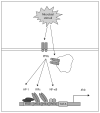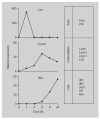Type I interferon: a new player in TNF signaling
- PMID: 20173389
- PMCID: PMC2827816
- DOI: 10.1159/000289199
Type I interferon: a new player in TNF signaling
Abstract
TNF and type I interferons (IFNs) are induced by microbial stimuli and mediate innate immune responses. They are also involved in the pathogenesis of chronic inflammatory diseases, such as rheumatoid arthritis and systemic lupus erythematosus. Activated macrophages are an important driving force of inflammatory reactions and one of the major producers of TNF in innate immunity and chronic inflammation. Despite the fact that cells at sites of damage are continuously exposed to both cytokines, little is known about mechanisms regulating TNF and type I IFN interactions during inflammation. In this review, we discuss the role of an IFN-beta-mediated autocrine loop in the regulation of gene expression program induced by TNF in myeloid cells.
Copyright (c) 2010 S. Karger AG, Basel.
Figures



References
-
- Medzhitov R, Janeway CA., Jr Decoding the patterns of self and nonself by the innate immune system. Science. 2002;296:298–300. - PubMed
-
- Banchereau J, Pascual V. Type I interferon in systemic lupus erythematosus and other autoimmune diseases. Immunity. 2006;25:383–392. - PubMed
-
- McInnes IB, Schett G. Cytokines in the pathogenesis of rheumatoid arthritis. Nat Rev Immunol. 2007;7:429–442. - PubMed
-
- Benedict CA. Viruses and the TNF-related cytokines, an evolving battle. Cytokine Growth Factor Rev. 2003;14:349–357. - PubMed
Publication types
MeSH terms
Substances
Grants and funding
LinkOut - more resources
Full Text Sources
Other Literature Sources

